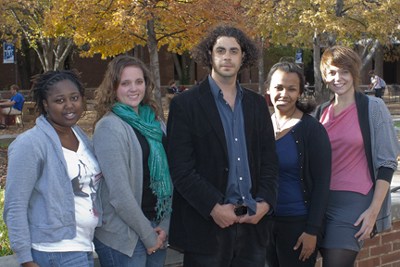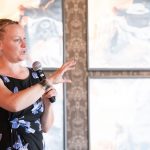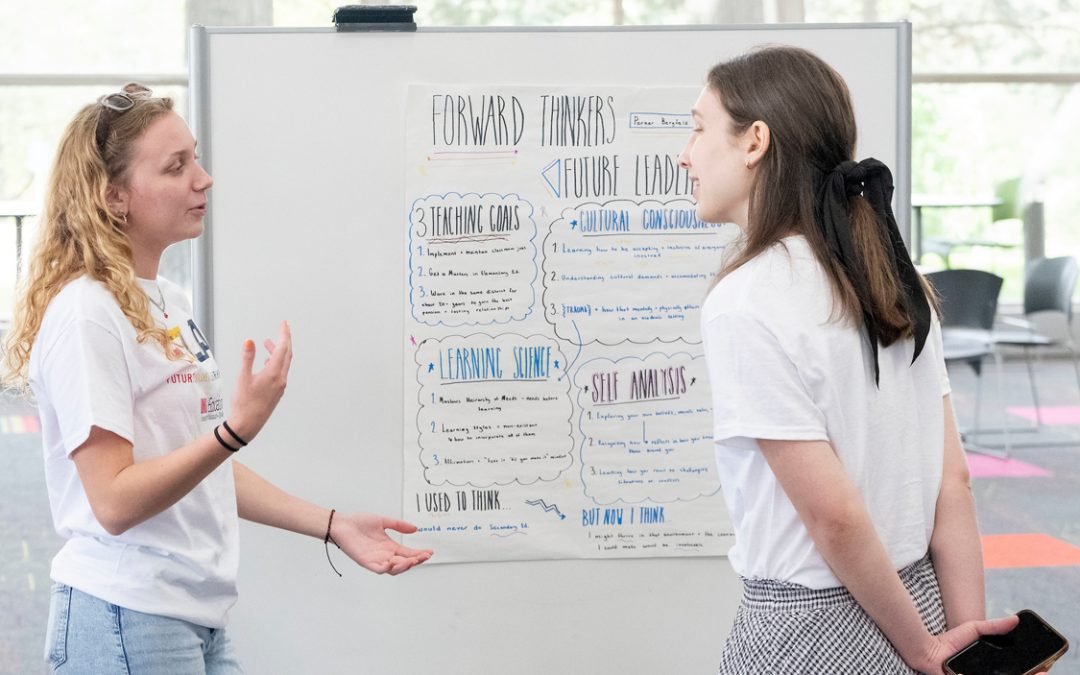
UMSL visiting assistant professor of sociology Peter Marina is leading four undergraduate students through research projects about St. Louis that will then be published. The students include (from left) Kennisha Robinson, Rebecca Feltz, Jennifer Pierce and Mandy Kowalski.
Four senior sociology majors at the University of Missouri–St. Louis are embarking on a research project, not only for the opportunity to get out of the classroom and get their hands dirty, but also the chance to see their work in print.
Peter Marina, visiting assistant professor of sociology in the Department of Anthropology, Sociology and Languages at UMSL, wanted to give students in his class the chance to explore sociology on a relatable level.
“Most of my classes require some sort of field work experience. The idea is to leave the classroom and go out into the field and see how the theoretical ideas from the sociological literature apply to the reality on the streets. It’s a go out and get your knees dirty old school Chicago style approach,” Marina said. “As much as I love theory and apply it to the development of my ideas in my own work, I’ve never wanted to become an armchair theorist. Our students seem to agree. I consider every one of my students budding sociologists and critical thinkers.”
So with the encouragement of Marina, students Jennifer Pierce, Rebecca Feltz, Mandy Kowalski and Kennisha Robinson began researching their topics.
Pierce is looking at the music scene in St. Louis, focusing on blues and punk rock.
“It’s really two projects,” she said. “My evaluation of the blues music sense is focusing on the sex depicted in the genre, while the punk one is identifying the youth subculture.”
Feltz chose to look at casinos in the area and the types of people that become gamblers. She wants to determine what motivates people to spend their money on gambling, especially when they don’t have the funds to spare.
“I’m interested in it personally because I’ve seen others gamble and what it does to them and I want to know why and how it gets to that point,” she said.
Kowalski is examining the growing sex-positive population in the St. Louis area. The group, who doesn’t want to be a minority or kept a secret, is focused on educating the public about its ideology on sexual activity without limits.
“I’ve been able to identify a coffee shop where many members of the community hang out,” she said. “I’ve conducted personal interviews with members to learn more about their live style.”
Robinson is examining urban gardens and the growing need for residents in disadvantaged communities to use these gardens in order to have fresh fruits and vegetables.
“There is this ongoing idea of ‘Urban Renewal,’ which is usually so alienated from the urban dwellers, and disassembles urban neighborhoods,” she said. “Urban gardening in St. Louis has been a hub for urban renewal, by way of the citizens, economic stimulation, the renewal of community involvement and a demand for a quality food system. Stores like Whole Foods Market and Trader Joe’s are not available in urban St. Louis and are not practical for many urban dwellers. I think that my applied research and fieldwork will be able to shine some positive exposure on the St. Louis urban renewal via the ‘Urban Gardening’ scene and culture.”
Once the research is completed, it will become a book.
“Though it is still in its infant stages, we are planning to take each of these student-conducted research projects and turn them into chapters in a book,” he said. “I will edit the book and the students and I will author and co-author various chapters. The book is tentatively titled ‘Urban Scenes and Alternative Spaces: Vibrant St. Louis in a Declining City’. I make no bones about it. We are not simply here to talk about ideas and pat each other on the back afterwards. Some of my students are presenting in two academic conferences this year discussing their work on various urban scenes in St. Louis. I am encouraging them to take this work and publish them in a peer-reviewed journal. St. Louis is an understudied city, at least in sociology, and we’re trying to change that.”














